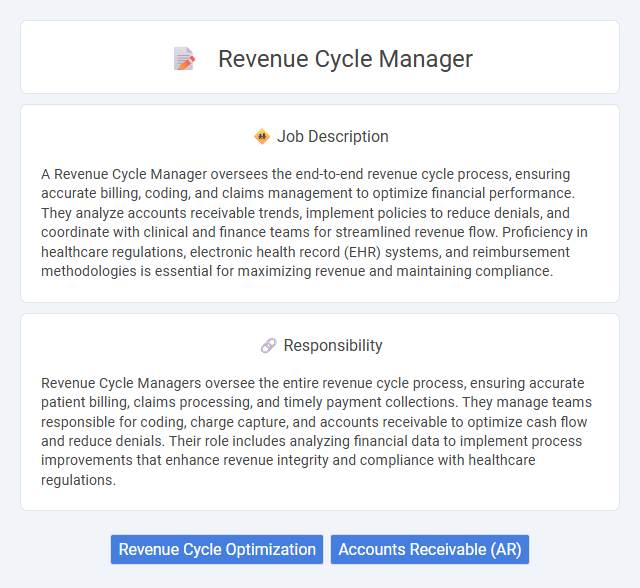
A Revenue Cycle Manager oversees the end-to-end revenue cycle process, ensuring accurate billing, coding, and claims management to optimize financial performance. They analyze accounts receivable trends, implement policies to reduce denials, and coordinate with clinical and finance teams for streamlined revenue flow. Proficiency in healthcare regulations, electronic health record (EHR) systems, and reimbursement methodologies is essential for maximizing revenue and maintaining compliance.
Individuals with strong analytical skills and attention to detail are likely to be suitable for a Revenue Cycle Manager position, as the role often involves overseeing financial processes and ensuring accuracy in billing and collections. Candidates who can handle high-pressure environments and demonstrate effective communication skills may have a higher probability of succeeding in this job due to the need to coordinate with multiple departments. Those who prefer routine tasks or lack proficiency in financial software might find the role challenging and less fitting for their strengths.
Qualification
Revenue Cycle Managers require a strong background in healthcare administration, finance, or business with a bachelor's degree often preferred, complemented by certifications such as Certified Revenue Cycle Representative (CRCR) or Certified Healthcare Financial Professional (CHFP). Proven expertise in billing processes, coding, insurance claim management, and regulatory compliance is essential for optimizing revenue flow and minimizing denials. Proficiency with electronic health records (EHR) systems and data analytics tools enhances the ability to analyze financial performance and implement effective revenue cycle strategies.
Responsibility
Revenue Cycle Managers oversee the entire revenue cycle process, ensuring accurate patient billing, claims processing, and timely payment collections. They manage teams responsible for coding, charge capture, and accounts receivable to optimize cash flow and reduce denials. Their role includes analyzing financial data to implement process improvements that enhance revenue integrity and compliance with healthcare regulations.
Benefit
A Revenue Cycle Manager likely improves financial performance by streamlining billing and collections processes, reducing errors and delays. There is a strong probability they enhance cash flow and minimize revenue loss through effective management of accounts receivable. Organizations may benefit from their expertise in compliance, ensuring adherence to regulatory standards that protect against costly penalties.
Challenge
Revenue Cycle Managers likely face significant challenges in accurately managing patient accounts and insurance reimbursements amid evolving healthcare regulations. Maintaining compliance while streamlining billing processes may require continuous adaptation to new technologies and policies. They probably encounter difficulties balancing efficiency with minimizing claim denials and optimizing cash flow for the healthcare organization.
Career Advancement
Revenue Cycle Manager roles offer significant career advancement opportunities by developing expertise in healthcare financial operations, including billing, collections, and compliance. Mastery of revenue cycle analytics and leadership in streamlining processes can lead to senior management positions such as Director of Revenue Cycle or Chief Financial Officer in healthcare organizations. Building skills in healthcare regulations, technology integration, and team management enhances promotion potential and industry recognition.
Key Terms
Revenue Cycle Optimization
Revenue Cycle Managers specialize in revenue cycle optimization by streamlining billing, coding, and collections processes to maximize healthcare provider reimbursements. They leverage advanced analytics and technology solutions to identify inefficiencies, reduce claim denials, and accelerate cash flow. Expertise in regulatory compliance and payer contract management ensures optimal financial performance and sustainability.
Accounts Receivable (AR)
A Revenue Cycle Manager specializing in Accounts Receivable (AR) oversees billing processes, payment collections, and ensures accuracy in patient invoicing. They analyze AR data to reduce outstanding balances and enhance cash flow efficiency within healthcare organizations. Proficiency in healthcare revenue cycle software and regulatory compliance is essential to optimizing AR management and minimizing financial risk.
 kuljobs.com
kuljobs.com